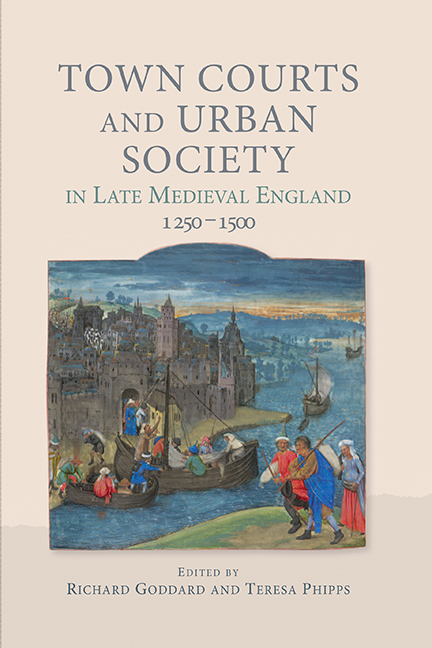Book contents
- Frontmatter
- CONTENTS
- List of Illustrations
- Contributors
- Acknowledgements
- List of Abbreviations
- Introduction
- Jane Laughton: In Memoriam
- 1 Town Courts in Medieval England: An Introduction
- 2 Borough Court Cases as Legal Precedent in English Town Custumals
- 3 The Priest of Nottingham and the Holy Household of Ousegate: Telling Tales in Court
- 4 Female Litigants and the Borough Court: Status and Strategy in the Case of Agnes Halum of Nottingham
- 5 Courts and Urbanisation: Jurisdiction in Late Medieval Seigneurial Boroughs and Towns
- 6 The Business of the Leet Courts in Medieval Norwich, 1288–1391
- 7 The Black Death and the Borough Court: The Changing Pattern of Social and Judicial Representation in Late Medieval Lincoln
- 8 Justice and Jurisdictions in Late Medieval Chester
- 9 Trust: Business Networks and the Borough Court
- 10 Society, Status and the Leet Court in Margery Kempe's Lynn
- Appendix: An Annotated List of Printed or Online Transcriptions and Translations of Medieval Town Courts in Britain to 1500
- Bibliography
- Index
10 - Society, Status and the Leet Court in Margery Kempe's Lynn
Published online by Cambridge University Press: 14 September 2019
- Frontmatter
- CONTENTS
- List of Illustrations
- Contributors
- Acknowledgements
- List of Abbreviations
- Introduction
- Jane Laughton: In Memoriam
- 1 Town Courts in Medieval England: An Introduction
- 2 Borough Court Cases as Legal Precedent in English Town Custumals
- 3 The Priest of Nottingham and the Holy Household of Ousegate: Telling Tales in Court
- 4 Female Litigants and the Borough Court: Status and Strategy in the Case of Agnes Halum of Nottingham
- 5 Courts and Urbanisation: Jurisdiction in Late Medieval Seigneurial Boroughs and Towns
- 6 The Business of the Leet Courts in Medieval Norwich, 1288–1391
- 7 The Black Death and the Borough Court: The Changing Pattern of Social and Judicial Representation in Late Medieval Lincoln
- 8 Justice and Jurisdictions in Late Medieval Chester
- 9 Trust: Business Networks and the Borough Court
- 10 Society, Status and the Leet Court in Margery Kempe's Lynn
- Appendix: An Annotated List of Printed or Online Transcriptions and Translations of Medieval Town Courts in Britain to 1500
- Bibliography
- Index
Summary
Lynn's borough leet court rolls from 1309 to 1434 comprise the most socially inclusive record to survive from late medieval Lynn. In the late 1370s, for example, they name over a thousand individuals who lived or traded in the town: many more than the sole surviving (but incomplete) poll tax return of 1379, and close to one third of the likely adult population. Described by Henry Harrod, who catalogued the rolls in 1867, as containing ‘very few entries of any moment’, the leet rolls have never been published, with the exception of a short run of entries from part of a single roll. Nor have they previously been subjected to systematic study, although Stephen Alsford included material from the court rolls in his online history of medieval Lynn, and Kate Parker considered the status of the leet officers as part of a study of the town's government and politics. The purpose of this chapter is to demonstrate how, despite their seemingly mundane contents and chronological gaps, the leet records can enlarge our understanding of the social make-up of one of England's leading port towns and throw new light on the internal political conflicts which plagued Lynn during the adult lifetime of Margery Kempe. Famous as the author of the earliest autobiographical text in English, Margery Kempe (c. 1373 to c. 1440) was the daughter of one of Lynn's leading townsmen, John de Brunham (or Burnham), wife to another merchant-burgess of Lynn, John Kempe, and the mother of fourteen children. Her book, rediscovered as a single complete manuscript in 1934, centres on her spiritual experiences and aspirations, but also contains vivid glimpses of everyday life in the early fifteenth century.
Lynn Bishop, despite its status as a ‘free borough’ under royal charters from 1204 onwards, remained a seigneurial borough until 1537, and the near-complete loss of records of episcopal administration in Lynn, including the local courts of pleas, has left a major gap in the archival evidence. Kate Parker expressed regret that ‘it has not been possible …
- Type
- Chapter
- Information
- Publisher: Boydell & BrewerPrint publication year: 2019



